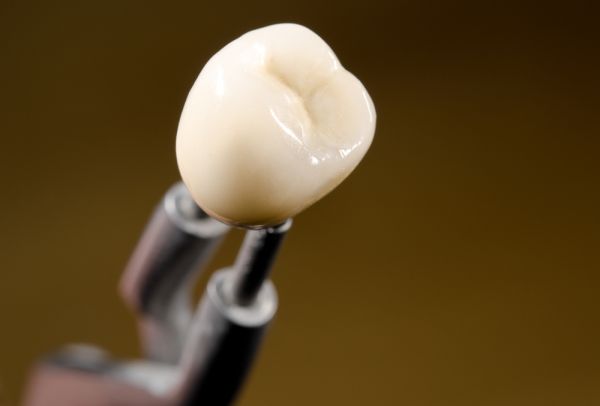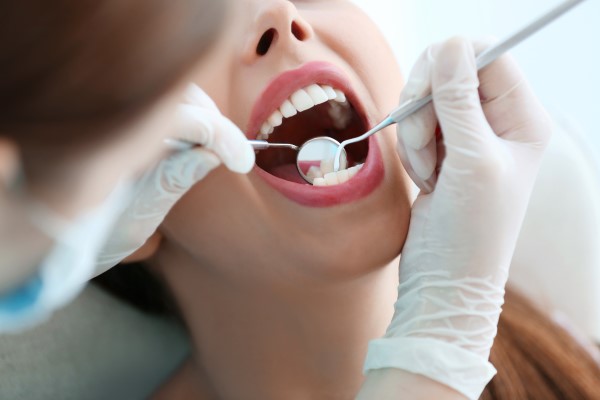Tips to Preserve Your Ceramic Crowns [Dental Restoration]

Looking for information on ceramic crowns? Getting a ceramic crown means investing in the future of your oral health. These protective tooth caps are used to restore broken, decayed, discolored or weakened teeth. Ceramic crowns are the best option when it comes to both appearance and functionality, especially when compared with other types of dental crowns.
Once a ceramic crown is placed, it has the potential to last decades if properly maintained. But just like natural teeth, crowns can still get damaged or need replacing.
How to get the most out of your ceramic crowns
The lifespan of a ceramic crown depends on the ability of the patient to care for it correctly. Daily wear and tear can take a toll on ceramic crowns. The following are some ways to preserve the appearance and functionality of your ceramic crowns.
Know which foods to avoid
Crunchy, hard and sticky foods are all bad news for teeth as it is. With a ceramic crown in place, the tooth is mostly protected from further damage and decay. However, the natural tooth underneath can still get cavities. Along the border of the crown near the gumline, the tooth is still susceptible to decay, as well.
To extend the life of a ceramic crown, it is crucial to eat well and limit carbohydrates. Tooth decay occurs when sugary, carb-rich foods stick around in the mouth. The bacteria in the mouth feed on these food particles, producing acid as waste. The acid then eats away at the enamel and causes cavities. Limit cake, cookies and candy to prevent cavities from forming around and under the crown.
Instead, try eating foods that are rich in calcium and protein. For example, leafy greens offer a boost of nutrition that encourages healthy teeth and gums. Celery and carrots are excellent sources of teeth-healthy nutrition as well.
Practice good oral hygiene
Brush and floss all teeth, including those that have been treated with a dental crown. Just because the crown itself is resistant to tooth decay does not mean it should not be cleaned. As detailed above, the border of the tooth and underneath the crown can still get cavities.
Brush after every meal to remove excess food particles and bacteria from the mouth. Floss once daily before brushing at bedtime to clear those hard to reach spaces between teeth.
Habits to avoid
Snacking throughout the day produces more bacteria and more opportunities for cavities than eating three meals per day. Saliva production levels are stressed when a person frequently snacks. Saliva cannot properly clean the mouth when it is used too often.
Other habits like chewing on ice and biting down on hard objects can threaten a ceramic crown. Never use teeth to open packages. Using teeth as a tool is never a good idea, neither for natural teeth nor those covered by a ceramic crown. Clenching and grinding teeth can wear down a crown over time, causing it to fail. Ask your dentist about a nightly mouthguard if you tend to grind your teeth at night.
Ceramic crowns can last a lifetime
Your crown is meant to last 15 years or longer. To find out how to get the most out of your ceramic crown, contact our office today to get a personalized care plan.
Request an appointment here: https://www.palmbeachdentistry.com or call Palm Beach Dentistry at (561) 225-2057 for an appointment in our Delray Beach office.
Check out what others are saying about our services on Yelp: Read our Yelp reviews.
Recent Posts
Many people may believe that they do not have time for routine dental care, which consists of daily brushing and flossing as well as periodic cleaning by a dentist. Admittedly, these tasks do take some time but should be a priority even in a busy schedule. People who do not take time for brushing, flossing,…
Professional dental cleanings are integral for keeping your mouth healthy. They remove plaque and tartar (hardened plaque) that regular brushing and flossing cannot, leaving your teeth and gums refreshed. Maintaining healthy habits that keep your smile bright and strong is essential to make the most of a dental cleaning. Caring for your teeth properly after…
When patients go for routine dental care, they may or may not have X-rays taken of their mouths. Dentists use these important diagnostic tools to check all layers of the tooth. While a key part of routine care, X-ray imaging may not be taken every visit. Every patient is different, and the recommended frequency for…
Maintaining routine dental care is important for oral and overall health, but many patients have questions about what it consists of beyond daily brushing and flossing. The right answers can help patients of any age understand the importance of providing optimum care for their teeth and the possible issues if they fail to follow through.…


